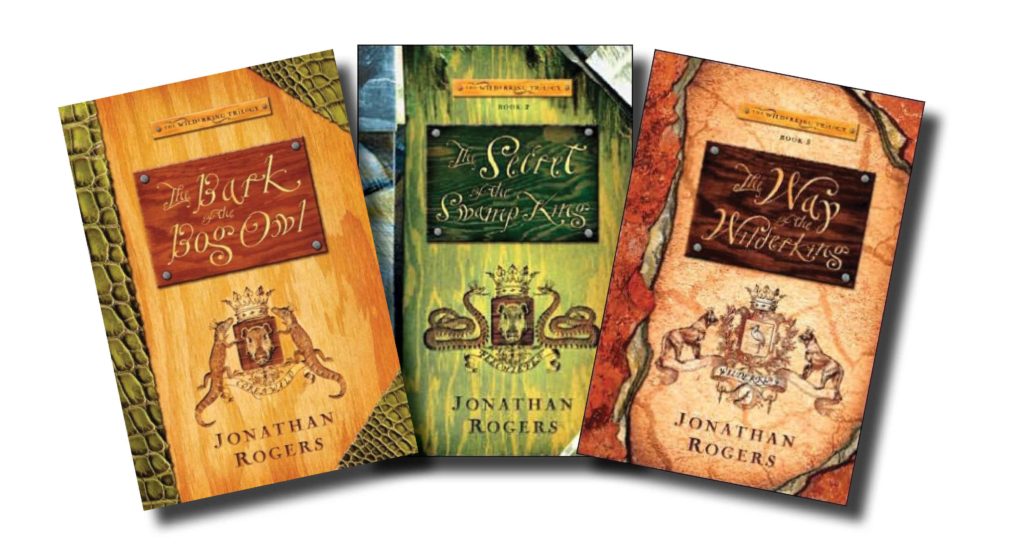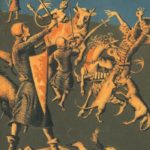There Be Dragons
 [Note from RLM: I’m turning my normal writing slot over to author Jonathan Rogers. He grew up in Georgia, where he spent many happy hours in the swamps and riverbottoms. He received his undergraduate degree from Furman University in South Carolina and holds a Ph.D. in seventeenth-century English literature from Vanderbilt University (but don’t let that intimidate you–you’re in for a treat). Jonathan lives with his wife and six children in Nashville, Tennessee.]
[Note from RLM: I’m turning my normal writing slot over to author Jonathan Rogers. He grew up in Georgia, where he spent many happy hours in the swamps and riverbottoms. He received his undergraduate degree from Furman University in South Carolina and holds a Ph.D. in seventeenth-century English literature from Vanderbilt University (but don’t let that intimidate you–you’re in for a treat). Jonathan lives with his wife and six children in Nashville, Tennessee.]
– – – – –
Once when eighteen or nineteen years old, my father and I were puttering up a familiar stretch of Georgia’s Ocmulgee River in a small aluminum boat. As we passed a sandbar that I had seen a hundred times, I was startled to see a part of the sandbar move. Only it wasn’t the sandbar that moved; it was a great, thick alligator, ten feet long at least, with a tail as big around as a saw log. I had been coming to the Ocmulgee River all my life, but I had never seen an alligator in its waters or on its banks. But there he was, as big as life and twice as natural.
It’s hard to articulate what I felt when I realized what I was seeing. The alligator was terrible to behold. But he was thrilling to behold too. If he had wanted to, he could have swept our little boat into the river and eaten us up. I know that alligators don’t ever behave that way (indeed, I knew it even then), but it wasn’t that reasoning part of my brain that first reacted to the sight of this monster. Was it the so-called “lizard brain”—the seat of the fight-or-flight reflex—that kicked in? Probably so. But it wasn’t just the lizard brain that came alive in that moment. It was also the part of the brain (or, more appropriately, the soul) that responds to mythology—to old stories of dragons and monsters and elves and dwarves that lurk at the edges of the worlds that we humans try to keep civilized and comfortable.
 In Surprised by Joy, C.S. Lewis describes those moments in which some earthly experience awakens us to the truth that there is more to the world than our earthly experience. In Lewis’s case, a little model garden his brother had made in a biscuit tin, Arthur Rackham’s illustrations of the Ring Cycle, a flowering currant bush—all seemingly inconsequential things—gave him “the stab, the pang, the inconsolable longing” for a world beyond this world.
In Surprised by Joy, C.S. Lewis describes those moments in which some earthly experience awakens us to the truth that there is more to the world than our earthly experience. In Lewis’s case, a little model garden his brother had made in a biscuit tin, Arthur Rackham’s illustrations of the Ring Cycle, a flowering currant bush—all seemingly inconsequential things—gave him “the stab, the pang, the inconsolable longing” for a world beyond this world.
For me, the sight of that alligator was just such a stab of what Lewis called Joy. I had seen alligators before. I had been to the zoo. I had been to the Okefenokee Swamp. But this alligator lived only ten miles away from my house. He was in “my” river, where I had been coming all my life. A week earlier, I had swum across its muddy waters, not a mile from the very sandbar where this great dragon lay like Smaug on his pile of treasure.
I lived in a world where the roads were paved and hot water came out of the faucet. We had a television, a VCR, a microwave oven. There were McDonald’s restaurants in my world and Top 40 radio stations and convenience stores that sold Coca-Cola and potato chips.
But there were also dragons.
My friends think it’s funny that every novel and short story I have ever written involves at least one alligator. I suppose it is kind of funny. But alligators for me carry a lot of metaphorical freight. They remind us that this world, the one where we live and move and have our being, is still a place of myth and marvel. This world, too, is a fantasy world.
– – – – –
 Jonathan Rogers, author of The Charlatan’s Boy and the Wilderking Trilogy, is happy to announce that the Rabbit Room Press (home of Andrew Peterson’s last two Wingfeather Saga books) is republishing The Bark of the Bog Owl, The Secret of the Swamp King, and The Way of the Wilderking.
Jonathan Rogers, author of The Charlatan’s Boy and the Wilderking Trilogy, is happy to announce that the Rabbit Room Press (home of Andrew Peterson’s last two Wingfeather Saga books) is republishing The Bark of the Bog Owl, The Secret of the Swamp King, and The Way of the Wilderking.
These paperbacks may be pre-ordered, insuring delivery in March, well-ahead of the official April 1 release date. In addition, pre-ordered books will help defray the publishing costs, which will insure a larger printing.
These books, excellent read-aloud stories perfect for middle graders, particularly middle grade boys, have been out of print for the last three years, so bringing them back for a new group of readers is a brilliant move by RRP. It’s also a fitting way to celebrate the tenth anniversary of the original publication of the first in the series.








































That sense of untamed wonder, of joyful fear, is what’s always drawn me to fantasy. That startled, heady realization that the world is wider and wilder than I’d ever imagined. The chill that smites me when I encounter something my waking mind can’t encompass. When my reasoning is stymied and my insecure rationality falls silent. When I stand in awe.
I think that, as Christians, our highest interaction with fantasy is to direct that kind of awe at the uncontainable God we so often relegate to stuffy sanctuaries and tedious tomes. Because He’s not tame, not predictable, and not beholden to the likes of me. There’s no one I oughta fear more, and no one I oughta be more glad to see.
I can relate as one growing up with alligators in every available body if fresh water. I have always looked at them as dragons or dinosaurs. Now as one who spends more time in the mountains I look at bears as giant protectors of the forest (who hopefully will ignore me as I walk by with food in my pack).
I think that’s why I love dragons–in theory. Seeing an alligator that big in real would send me running in the opposite direction! The same with reading accounts of people who have seen sea monsters–the wonder and terror is why they forget to take a picture.
I love that in books. The oh-my-gosh-what-is-that feeling. As an urban kid who always wished for horses and wolves, I might as well wish for dragons, too.
My family still owns the piece of land my great-grandfather staked in the Land Run, and it borders on a river. Awhile ago we were derping around while Dad was assessing how much of the fence line had eroded, and we spotted a water moccasin bobbing and weaving as it crossed the river, part swimming, part being pushed by the slight current. Of course, my thoughts were “[bleep], [bleep], [bleep]-ing cottonmouth!” And this story has no real point besides to establish some kind of credibility when I say, you freakin’ Georgian heathens and your misspelling Okmulgee like that. 😛
Snow used to do it for me as a kid. Snowflakes are so fine and intricate — you can see the complexity of a snowflake on the finger of your glove. Your pastor uses the complexity of snowflakes to remind the congregation of the greatness of God’s design. And the irony between this and the creation theory of the canopy of vapor that caressed the young warm Earth before the Flood is honestly joyful to you as a child, before you learned to be cynical.
This winter was a cold one. There’s something inherently other about subzero temperatures on a dim, clear morning, waiting outside for the bus. The way your breath sticks in your throat, how the dryness of the air is tangible — it’s not comfortable, but it’s more alien than agonizing, at least in the short term.
Suck on that, Southerners!
I went outside to get the mail the other day (living in the country, this requires a 0.2 mile hike), and my throat was burning from the cold. Alien atmosphere, in a way.